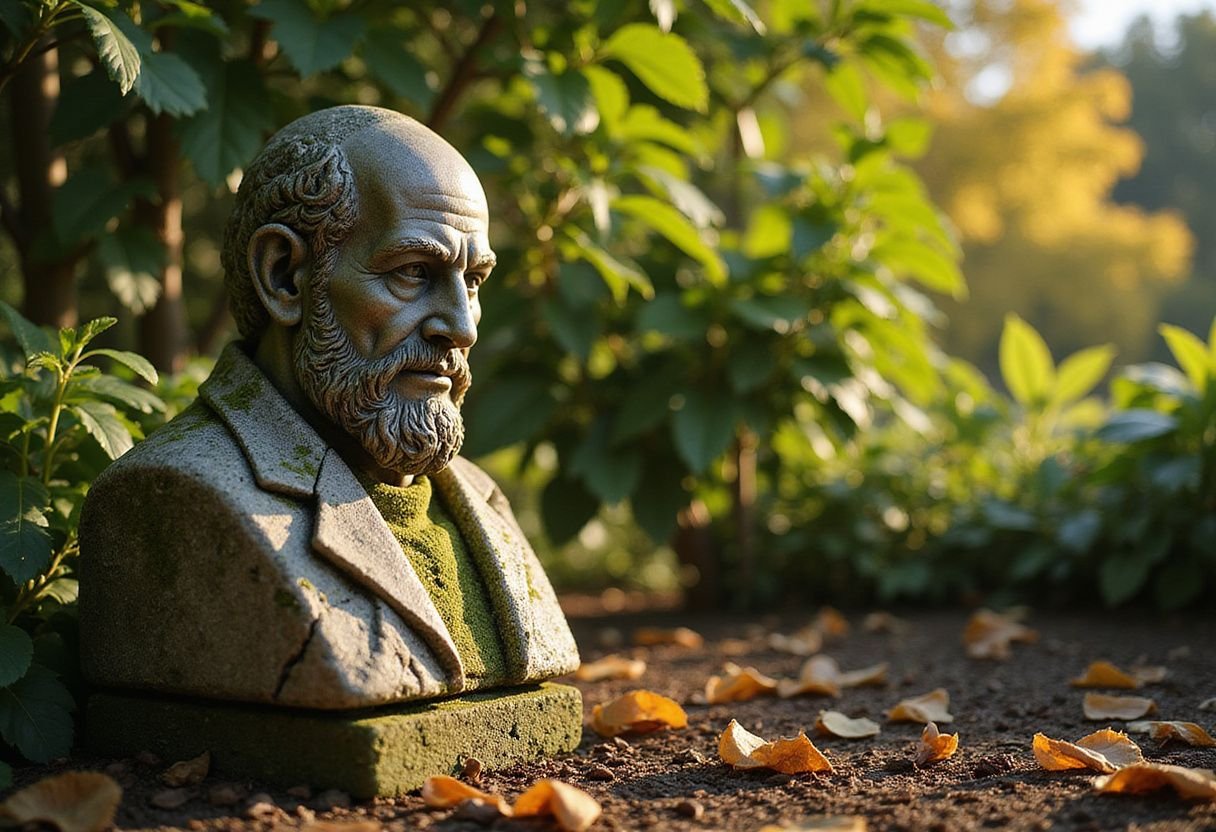It is easy to feel lost or stuck when life gets hard. Many people face these feelings each day. Seneca wrote that wasting time by putting things off is the biggest waste of life. When I looked into Stoic wisdom from Marcus Aurelius, Seneca, and Epictetus, I found simple ideas that help with daily struggles.
These lessons show how reason and self-control can make a real difference. Discover how using Stoic philosophy can bring you more calm and a better life.
Contents
- 1 Focusing on What is Within our Control
- 2 Accepting What We Cannot Change
- 3 Practicing Mindfulness
- 4 Embracing Obstacles and Challenges
- 5 Conclusion
- 6 FAQs
- 6.1 1. What is Stoicism, and who are Marcus Aurelius, Seneca, and Epictetus?
- 6.2 2. Why do people learn Stoic lessons too late in life?
- 6.3 3. How does Stoic philosophy help with self-discipline?
- 6.4 4. Can Stoic teachings improve daily life?
- 6.5 5. What key lesson connects all three philosophers’ ideas?
Focusing on What is Within our Control
I focus on what I can control. It helps me break free from worry and stress.
Distinguishing between internal and external factors
I see two types of factors in life: internal and external. Internal factors are things I control, like my thoughts and actions. External factors are outside my control, such as other people’s opinions or events around me.
Stoicism teaches me to focus on what is within my control. This shift helps me find peace.
True freedom comes from accepting this difference. By letting go of what I cannot change, I reduce stress and frustration. Marcus Aurelius emphasized self-control and resilience, guiding me to stay grounded in tough times.
Understanding these distinctions allows for a simpler life filled with virtue and acceptance.
Achieving true freedom
Achieving true freedom means focusing on what I can control. This idea comes from Stoic teachings. Marcus Aurelius mentioned the need for resilience and self-control. True freedom grows when I stop worrying about things outside my power.
Instead, I find strength in my choices and reactions.
Seneca taught me that procrastinating is a waste of life. By taking charge of my time, I embrace true liberty. Living simply also plays a role in this journey toward freedom. Many distractions fade away when I seek moderation and balance in my life.
As obstacles arise, they become chances to grow and learn more about myself.
Accepting What We Cannot Change
We all face things we cannot change. Accepting them can bring us peace and help us live better lives.
Aligning expectations with reality
Facing life often means dealing with what we cannot change. I have learned that aligning expectations with reality brings peace. Marcus Aurelius taught me to view setbacks as chances to grow.
Accepting outcomes can lead to tranquility in the midst of chaos.
Seneca warned against procrastination, saying it wastes time and energy. By managing my expectations, I focus on what is within my control. This practice helps me build resilience and self-discipline.
It reminds me that success and failure are just parts of life’s journey, both deserve equal regard. Moving forward requires embracing challenges, no matter how tough they seem.
Finding peace
Acceptance helps me find peace. I align my expectations with reality. Stoic teachings remind me that perception shapes everything. Accepting what I cannot change brings calmness in tough times.
It allows for true freedom, where only what’s within my control matters.
Living simply also contributes to this peace. Marcus Aurelius taught resilience and self-control, which guide my actions each day. Treating both success and failure the same eases stress too.
This approach helps me reflect on life’s ups and downs without fear or regret. Embracing these lessons leads to a stronger mindset as I tackle obstacles ahead.
Practicing Mindfulness
Practicing mindfulness helps me focus on the present. I ask myself what is truly necessary in my life and make choices with care.
Constantly questioning necessity
I focus on what I really need. Stoic teachings remind me that our perceptions shape our world. By constantly questioning necessity, I learn to live simply. Seneca said procrastinating wastes life; this pushes me to act wisely and swiftly.
Living without excess helps me find balance. It allows for more moments of reflection and gratitude. This practice brings peace to my mind as I recognize what truly matters in life.
Now, embracing obstacles becomes easier when I know they lead to growth and resilience.
Living deliberately
Living simply is a key lesson I learned from Stoicism. I often question the things I do. This helps me see what is truly necessary in my life. Marcus Aurelius taught me that focusing on what matters brings peace.
By being mindful, I make better choices each day.
Each morning, I set clear goals to own my time. This practice aligns with Stoic teachings about discipline and self-control. It creates a sense of balance in my life. Every moment becomes an opportunity for growth and reflection as challenges arise.
Embracing obstacles feels like embracing strength within myself now.
As I navigate through these lessons, accepting what cannot be changed also plays a vital role in my journey toward inner peace.
Embracing Obstacles and Challenges
Obstacles and challenges can feel tough. Yet, they are chances for us to grow stronger and wiser.
Opportunities for growth and virtue
Obstacles can be helpful. They push us to grow and learn. Each challenge I face teaches me something new. Stoic thinkers like Marcus Aurelius emphasize this point. He believed that we should see problems as chances for improvement.
In my life, I have found that facing difficulties builds resilience and strength.
Practicing self-control is essential too. It helps keep emotions in check during tough times. By treating success and failure the same, as Stoics suggest, I find balance in my response to life’s ups and downs.
Embracing hardship leads me to greater wisdom and virtue, which are key lessons from Stoicism. Each struggle becomes a step toward a better version of myself, reinforcing the value of reflection and acceptance in my journey.
Cultivating resilience
Life throws many challenges my way. I see these obstacles as chances to grow. Stoic teachings help me build resilience. Marcus Aurelius taught that self-control is key. He faced difficulties with strength and grace.
Every setback is an opportunity for virtue, not a failure. Seneca warned against procrastination; it wastes precious time. By living simply, I learn to focus on what matters most. This helps me stay balanced in tough times.
Cultivating resilience means facing life head-on and finding strength within myself.
Mindfulness plays a major role next in this journey of growth and understanding.
Conclusion
Stoic lessons shape how I see the world. They teach me to focus on what I can control. Acceptance brings peace during hard times. Embracing challenges makes me stronger and wiser. These truths help me live a better life now, not later.
FAQs
1. What is Stoicism, and who are Marcus Aurelius, Seneca, and Epictetus?
Stoicism is a philosophy that teaches wisdom, self-control, and acceptance. Marcus Aurelius, Seneca, and Epictetus were famous thinkers who shared lessons on virtue and resilience.
2. Why do people learn Stoic lessons too late in life?
People often face adversity before they see the value of reflection or mindfulness. They may not practice moderation or balance until hardship forces them to seek new perspective.
3. How does Stoic philosophy help with self-discipline?
Stoicism guides people to use reason for better choices. It shows how ethics and duty build strong habits like self-control and moderation.
4. Can Stoic teachings improve daily life?
Yes; by using wisdom from Stoicism, like accepting what you cannot change, you gain more peace of mind. Practicing virtue helps you handle stress with resilience.
5. What key lesson connects all three philosophers’ ideas?
All three taught that living with virtue leads to true happiness. Their words show that ethics, reflection, and balance create strength during tough times.

